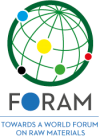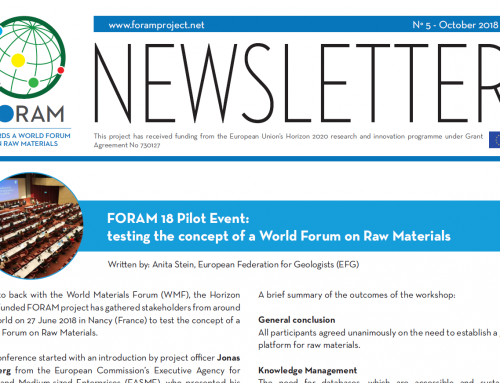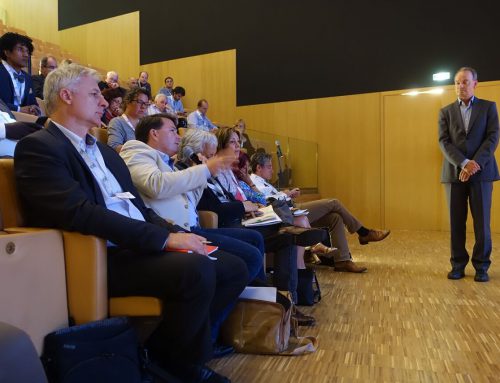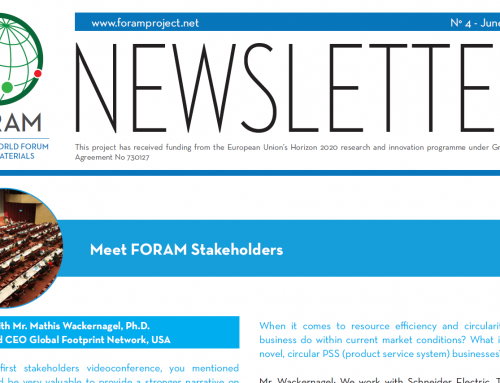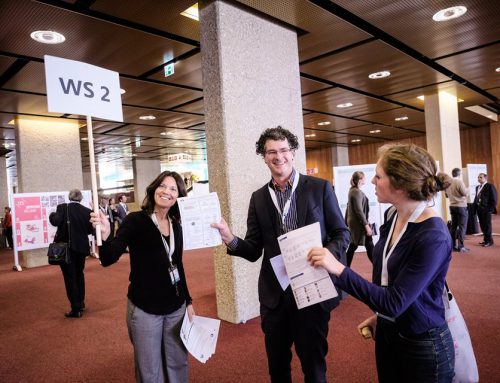Berlin, 21 May 2019
It is imperative for industry, governance and independent bodies to attain an intersectional point. Leadership to sustainable mining is needed in all different silos of the value chain (policies, industry, science, public). The main challenge is to set a common goal that involve all stakeholders in the raw materials industry in order to consider sustainability in a holistic approach and breaking the silo approach. Strong political leadership and support is however crucial to facilitate an effective dialogue that can really change things in the real world. These are the key messages that the participants themselves formulated at the “Stepping up International Cooperation” session of the EIT Raw Materials Summit, held in Berlin, 21 May 2019. The meeting was organised by the EU Horizon2020 FORAM network, led by the World Resources Forum and EuroGeoSurveys.
Slavko Solar (EuroGeoSurveys) reported about the outcomes of the Horizon2020 project Towards a World Forum on Raw Materials (FORAM) that has set up a global platform of international experts and stakeholders. The platform aims at strengthening international cooperation among G20 Member countries as well as other third countries active in the extraction, processing and recycling of mineral raw materials. The project and its network support the implementation of the Raw Materials Initiative and the Strategic Implementation Plan of the European Innovation Partnership on Raw Materials. Together with its Advisory Board and the established platform of international experts and stakeholders the FORAM Stakeholders Network has to date got inputs from more than 200 decision-makers and thought leaders in the sector worldwide.
The FORAM stakeholder dialogue identified the following priorities for strengthening international cooperation worldwide:
• Innovation, security of supply and growth
• Resource-efficiency, environmental and social aspects
• Policies, legal and financial frameworks
• International cooperation and outreach
• Research, capacity building and education
FORAM has concluded that international cooperation requires a participative process including stakeholders along the entire value chain of raw materials (primary and secondary) and of all types (industry, government, IGO, NGO, civil society) and all world regions. To improve raw materials governance at global level, it is essential to enforce the appropriate policies, improve financial frameworks and implement more pro-active strategies. The EIT Raw Materials Summit session on “Stepping up International Cooperation” aimed to focus on showcasing best practices in regulatory and financial frameworks for implementing raw materials policies, on national, regional and international levels, not only on primary raw materials but also on secondary raw materials and the circular economy.

Marcin Sadowski, Head of Raw Materials, EASME, European Commission, introduced the EIP Strategic Implementation Plan of the European Commission and explained its international cooperation strategy. From 1984 to 2027, EU is planning to have a 30-fold increase in investment in Research and Innovation projects, for which participation of international partners will be strongly encouraged. He highlighted a series of Horizon 2020 projects (INTRAW, STRADE, MinFuture, FORAM, INTERMIN and COLLECTORS), as well as ERA-MIN projects, which have had a specific focus on enhancing international cooperation on raw materials.

Peder Jensen, Head of Secretariat, International Resource Panel, UN Environment, presented the main objectives of the IRP report on “Mineral Resource Governance in the 21 Century: Gearing industries towards sustainable development”. The recently published report has made an assessment of how the extractive sector can be better governed to advance economic diversification and sustainable development. Among others, the report has proposed a new governance framework termed a Sustainable Development Licence to Operate. The report calls for upward harmonization of international standards along the mining value chain and has explored supportive policy options. According to Jensen, the need for such a new governance document is mainly because of a global increase in the demand for metals and minerals – even despite progress towards a circular economy – and moreover because of the importance of the extractive industry in achieving the 17 Sustainable Development Goals (SDGs). He stated that negative externalities are a major concern as mine grades deteriorate in older mines and as mining moves to new areas (referring to sea-bed mining). He indicated that the new governance framework, Sustainable Development License to Operate, includes multiple actors (public, private and third sector) and encompasses principles, policy options and best practices to enhance the contribution of mining sector towards achieving SDGs:
Principles are:
• Stakeholder engagement
• Comprehensive, consistent and flexible national governance regimes
• Coherent global governance architecture
• Transparency & Accountability
• Support poverty reduction, economic diversification and structural transformation
• Systems-thinking
• Inclusiveness and reduced gender and other inequalities
Policy options:
• Discovery and award of licenses
• Regulation and monitoring of operations
• Collection of rents
• Revenue management and investment
• Implementation of sustainable development policies
Best practice:
• Upwards harmonization of international standards along mining value chain
In his final words, Peder Jensen stated that during the Fourth Session of the UN Environment Assembly (UNEA 4), held in Nairobi,11-15 March 2019, and based on such reports by the UNEP International Resource Panel and the UNEP GRID, the UNEA Resolution 4/23 requests the Executive Director to:
• collect information on sustainable practices;
• identify knowledge gaps and options for implementation strategies;
• undertake an overview of existing assessments of different governance initiatives and approaches on sustainable management of metal and mineral resources;
• report to the fifth session of the United Nations Environment Assembly.

Martine Rohn-Brossard, Deputy Head, International Affairs Division of the Swiss Federal Office for the Environment introduced the strategies that Switzerland has implemented to be engaged in international cooperation on raw materials. In addition to active participation in international cooperation programmes (e.g. UNEP, UNECE, OECD), she highlighted two reports that have been recently published: 1) The “Green Economy Report to the Federal Council, 2013-2016”, which provides measure on strengthening the ecological responsibility and transparency of the extractive sector, 2) “Federal Council’s report on Swiss commodities sector: current situation and outlook (2018)”, in which strategies and actions areas for reducing the environmental impacts of extractive industry, improving transparency and ecologically responsible business practices have been recommended. By referring to the results of the UNEA 4, she stated that to face the increased demand for mineral raw materials, there is an urgent need and a political momentum to improve mineral resources governance and sustainable infrastructure.
It is essential to encourage governments, businesses, NGOs, academia and international institutions to promote:
• Awareness of how the extractive industries can contribute to sustainable development;
• Due diligence best practices along the supply chain, including the continuous increase of transparency;
• Capacity-building;
• PPP;
• Research, development and technological innovations;
• Sustainable mining and sourcing;
• Reduction of impacts.
Rohn-Brossard emphasised the importance of international meetings and she listed upcoming events that contribute to fostering dialogue among involved stakeholders. These include the EITI Global Conference (Paris, 18-19 June 2019), World Resources Forum (Geneva, 23-24 October 2019), Intergovernmental Forum on Mining, Minerals, metals and SD (Geneva, October 2019) and OECD Green Growth and SD Forum (Paris, 26-27 November 2019) and in particular the UNEA 5 meeting which will be held in February 2021 in Nairobi.

Stefan Bringezu, Director, Center for Environmental Systems Research, Kassel University, focused his presentation on the importance of data availability on primary and recycled materials production. The mineral resources have positive role in shaping our life and at the same time a negative impact on environment and landscape. Global metal and non-metallic mineral extraction is increasing and from 2017 to 2060 the used resource extraction is predicted to be doubled (IRP 2019). Increasing extraction has had an inevitable effect on global wellbeing. On the other hand, increasing “unused” extraction of resources has led to more waste, more water distraction, more landscape change and more energy consumption, hence negative impact on environment.
By citing a study by Murguia et al. 2016, he added that most of the mining practices hit higher biodiversity areas. Taking all these elements into consideration, there is an urgent need for standard protocol for mining/querying operations and planning and data will be needed on a cradle-to-materials basis. Such data sets would be useful to assess environmental impacts of base materials in a comparable way, to check potential conflicts (e.g. on water, biodiversity), to prepare licenses to operate and to feed monitoring of resource flows at regional/national level. A standard protocol for mining and refining operations could provide basis for comparable data and regular up-date on total amount of mineral extraction, total water withdrawn, and total land and energy used.
Bringezu stressed that a standard protocol for mining/quarrying and refining/recycling would substantially improve the data basis for resource management and recommended that the FORAM network may embark on that mission and form an international working group towards this goal.

Asja Mrotzek-Bloess, Researcher, Clausthal University of Technology (TUC), presented an example of how a university and research institute can contribute to enhancing international cooperation. One of the research areas of the Clausthal University is on raw materials supply and resource efficiency where both primary and recycled materials will be studied. By running joint research projects with China, Brazil, South America, Southern Africa and Kazakhstan, TUC is facilitating the cooperation in a global level.

Rokhaya Samba Diene, Director, Senegalese Geological Survey, introduced the PanAfGeo project, “Pan-African Support to the EuroGeoSurveys-Organisation of African Geological Surveys partnership”.
This is an EU-African initiative co-funded by the European Commission which will in particular tackle the issues related to the governance of mineral resources, sustainable exploitation of non-energy mineral resources, prevention and mitigation of natural and man-made disasters and development of local mining private sector. This project represents a step forward in the political commitment to the development of EU-Africa cooperation.
Ferdinand Maubrey, Managing Director (Upstream) at RCS Global Group, gave a presentation on “Cooperation along a minerals supply chain under scrutiny: the case of Cobalt”. The RCS Global Group is a supply chain due diligence advisory and audit firm specialized on human rights risks along mineral supply chain, including cobalt and 3TG (conflict minerals).

RCS works with companies along the supply chain, including consumer-facing downstream companies, refiners in the midstream and producers in the upstream. He focused on the case of cobalt, the conflict mineral of moment, which is the key ingredient in lithium-ion batteries and is mainly produced in Democratic Republic of Congo (DRC). Cobalt has a highly complex supply chain associated with the risk of child labor other risks related to artisanal practices. Therefore, it has reputational risk for consumer facing downstream companies (e.g. Apple, Samsung, Microsoft, VW, BMW). The complexity of cobalt supply chain is in particular caused by the existence of hidden (illegal) players in the chain which will in turn create a complex stakeholder community in upstream, midstream and downstream level.
According to Maubrey, possible solutions to overcome the complex and conflicted supply chain of cobalt are:
• Supply chain mapping and risk identification,
• Audits
• Development of standards
• Blockchain traceability
• Community projects
• Mine site monitoring
However, there are also challenges being caused by the following factors:
• Many companies are new to cobalt due diligence and scrutiny,
• Market factors are still more important,
• Lack of regulation,
• Competition between brands,
• Supply chain are geopolitical
These will all lead to having:
• Responsible sourcing as competitive space rather than a cooperative one,
• Proliferation of standards,
• Increased compliance burden
• Proliferation of competing pilot projects and therefore lack of impact on the ground.
He stressed that already for 3 years there have been efforts towards initiating dialogue and improving coordination, cross-recognition efforts on standards, interoperability efforts for blockchain traceability pilots, trends towards transparency incentivizing the sharing of information and EU Conflict Minerals Legislation and trends towards turning “soft” to “hard law”. However, there are still no promising signs for improving the situation. He concluded that the efforts need to consider lessons learnt from the “conflict minerals” and “blood diamond” experiences.
Bas de Leeuw (Managing Director, World Resources Forum), co-chair of the session, gave the opportunity to the participants to highlight the key message and lessons learnt from the discussions.

They came to the following findings:
• It is imperative for industry, governance and independent bodies to attain an intersectional point. We say no to working in silos. Collaboration=Win-win
• The main challenge is to set a “common goal” that involve all stakeholders in the raw materials industry in order to consider sustainability in a holistic approach
• Strong political leadership and support is crucial to facilitate an effective dialogue between the different sectors/silos/audiences to really change things in the real world,
• Rethink mining industry to make it more transparent
• Leadership to sustainable mining is needed in all the different silos (policies, industry, etc.)
In his closing words, De Leeuw informed the participants that the outcomes of this discussion and progress made will be reported to the upcoming World Resources Forum 2019, to be held in Geneva, October 23-24, 2019 as well as to the Raw Materials Week, to be held in Brussels, November 18-22, 2019.

The Raw Materials Summit, the flagship event organised by the EIT RawMaterials, has taken place on 20-22 May in Berlin, Germany. EIT RawMaterials, initiated and funded by the EIT (European Institute of Innovation and Technology), a body of the European Union, is the largest consortium in the raw materials sector worldwide. Its vision is to develop raw materials into a major strength for Europe. Its mission is to enable sustainable competitiveness of the European minerals, metals and materials sector along the value chain by driving innovation, education and entrepreneurship. EIT RawMaterials unites more than 120 core and associate partners and over 190 project partners from leading industries, universities, research and technology organizations from more than 20 EU countries. Partners of EIT RawMaterials are active across the entire raw materials value chain; from exploration, mining and mineral processing to substitution, recycling and circular economy. They collaborate on finding new, innovative solutions to secure supplies and improve the raw materials sector in Europe. The summit has gathered experts from Europe and the rest of the world to discuss Innovation and new Technologies covering the entire raw materials value chain. Most relevant topics in the raw materials sector were addressed such as strategies concerning supply and access of raw materials, European industrial competitiveness and innovation capacity as well as entrepreneurship and innovation in education.
Presentations of the session available upon request. Kindly write to info@wrforum.org
